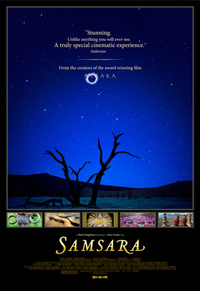Fever Dreams of a Tangential Wheel: Fricke’s Latest a Visual Feat, Contextual Blunder
 A veritable poem of moving pictures, Ron Fricke’s latest visual analysis of omniscient transcendence, Samsara, is exactly the kind of stunning mastery of images one could possibly ever hope to see in a theatrical setting. That said, one wonders if its lofty pretensions wouldn’t be more at home in a brainwashing planetarium, with Fricke’s visual compositions devolving blunty into half-assed politics that, limited to images only, lack the necessary words required to justify several missteps typical of the privileged vantage point.
A veritable poem of moving pictures, Ron Fricke’s latest visual analysis of omniscient transcendence, Samsara, is exactly the kind of stunning mastery of images one could possibly ever hope to see in a theatrical setting. That said, one wonders if its lofty pretensions wouldn’t be more at home in a brainwashing planetarium, with Fricke’s visual compositions devolving blunty into half-assed politics that, limited to images only, lack the necessary words required to justify several missteps typical of the privileged vantage point.
A visual journey about the interconnection that runs through human life, Fricke juxtaposes vast landscapes with monumental human achievements, including cityscapes and various architectural and artistic feats. A non-narrative, experimental journey, which, purportedly, takes off where the filmmaker’s last work, Baraka (1992), left off, his visual enterprise spans five years of time and ventures through twenty-five countries. Samsara is Sanskrit for “the ever turning wheel of life,” and though Fricke’s film is indeed reflective of an ever turning orb as it is constantly rolling fluidly into one sequence after another, it is hardly a comprehensive portrait of the wheel of life and the themes and experiences that connect human beings as a species.
Shrugging off any sort of written treatment, there’s a definite trance-like quality to the beautiful images, with shot compositions that, at times, can only be described as breathtaking. Filmed in 70mm Panavision, Samsara blends slow motion with time lapse photography, enriching the film as if it were a waking dream, and exhibiting a mastery of cinematic form. However, the lack of definite structure does get tedious, and the overuse of slow motion (and eventually becomes monotonous. But not before Fricke decides to devolve into visual message montages, such as showing flustered chickens being blustered around before they’re killed for mass consumption, eventually ending up in the mouths of overweight Americans, numbly unaware of the origination story of their fast food. We visit a munitions factory, then witness a man buried in a coffin shaped like a hand gun, then an American family of yokels brandishing their rifles, looking, of course, ridiculous. We see sex dolls being manufactured, then visit a Thai club of sex workers, where at least some of the performers might be transgendered or in drag. The trouble is, Fricke’s visual messages are trapped without explanation and without definitive context, resulting in a shallow and pedantic interpretation of images.
Do we need to see the mass slaughter of animals for human consumption right before they’re stuffed into the ravenous maws of obese fast food consumers? Fricke, who contends to deal with “humanity’s relationship to the eternal,” doesn’t address, or isn’t able to in images alone, the root of overpopulation that seems to necessitate cruel methods of food production. In a planet with too many people, civilized cultures still define life fulfillment around the creation of progeny. Progeny will always need to eat chicken (or some other life form). Unfortunately, these montages in the latter half of Samsara amount to as much sense as the Cate Blanchett leg-breaking sequence from The Curious Case of Benjamin Button (2008). If the word samsara connotes an endless cycle, the curiously judgmental overtones in the latter half of the film are even more vulgar in afterthought. Ron Fricke gives us the vantage point of the heavens, but his eye (or rather, his editing) is not omniscient or subjective, but rather terrestrial. There’s a beauty to be admired and even cherished in Fricke’s latest work, but there’s also evidence of a profane and monotonous nature to our daily existence at work here. Samsara, the ever turning wheel of life, must have some other wheels out there that keep the universe rolling along.


